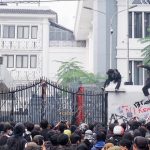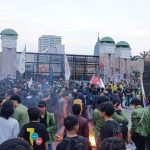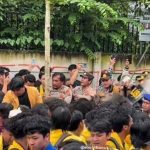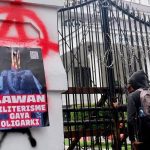Indonesia Rises Up againt Militarism
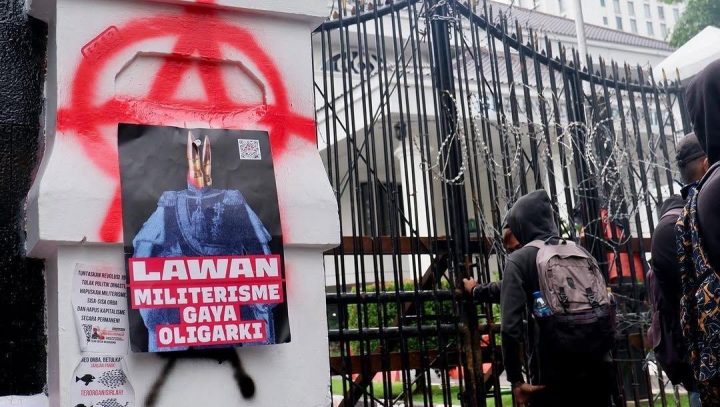
International Solidarity Call:
Halt Indonesia’s Slide into Military Dictatorship—Repeal the Authoritarian TNI Law Before It’s Too Late!
We, Indonesian groups, organizations, activists, and individuals, raise our voices in outrage and condemnation as the Indonesian Parliament legalizes the revised Indonesian National Armed Forces Bill (UU TNI) today — 20.03.2025. This law marks a devastating blow to democracy, human rights, and civilian supremacy in Indonesia, signaling a dangerous shift toward militarism and the rise of neo-fascist tendencies reminiscent of the dark days of the Suharto regime.
The revised UU TNI, now enacted, grants the military unprecedented powers to intervene in law enforcement, counter-terrorism, and civilian affairs. This blatant militarization of Indonesian society threatens to dismantle decades of democratic progress, suppress dissent, and institutionalize human rights violations. By eroding the boundary between military and civilian roles, this law entrenches authoritarianism and undermines the very foundations of democracy.
We cannot ignore the historical parallels. Under Suharto’s military-backed dictatorship (1966–1998), Indonesia endured a brutal regime characterized by widespread human rights abuses, corruption, and the suppression of democracy. The military, or TNI, was a central pillar of Suharto’s authoritarian rule, acting as both a political enforcer and a tool of repression. The regime’s fascist tendencies silenced dissent, exploited resources for personal gain, and entrenched systemic corruption, leaving a legacy of trauma and injustice that Indonesians are still grappling with today.
The revised UU TNI risks reviving this dark chapter. By expanding the military’s role in civilian affairs, the law paves the way for a return to the militarism, corruption, and authoritarianism of the Suharto era. This is not just a step backward—it is a leap toward neo-fascism, where the military becomes a tool of oppression.
A Dangerous Continuation of Militarism
The timing of this law is deeply alarming, given the political rise of Prabowo Subianto, a former military general with a controversial past. Prabowo, who served as a high-ranking officer under Suharto, has been implicated in numerous human rights abuses, including the kidnapping of pro-democracy activists in 1998 and atrocities in East Timor and Papua. His political ascension, now as Indonesia’s president, raises serious concerns about the resurgence of militarism and authoritarianism in the country.
Prabowo’s background as a military leader with close ties to the Suharto regime underscores the dangers of the revised UU TNI. His presidency, combined with the expanded powers granted to the military, creates a perfect storm for the erosion of democracy and the normalization of authoritarian practices. This law not only reflects Prabowo’s militaristic vision for Indonesia but also threatens to legitimize the use of military force against civilians, activists, and political opponents.
We stand in unwavering solidarity with the people of Indonesia—students, activists, human rights defenders, and civil society organizations—who have courageously opposed this law. Our voices represent the aspirations of a free and democratic Indonesia, have been ignored by a government that prioritizes militarization over the will of its people.
We Demand Immediate Action:
1. Repeal the Revised UU TNI Now: The Indonesian government must immediately revoke this dangerous law and halt all efforts to expand the military’s role in civilian life.
2. Restore Civilian Control: The military must be subordinated to civilian authority, as required in any democratic society. Its role must be strictly limited to defending the nation from external threats.
3. End Militarization and Protect Human Rights: The Indonesian government must ensure that the revised UU TNI is not used to suppress dissent, target activists, or violate human rights.
4. Respect the People’s Resistance: The government must listen and obey to the millions of Indonesians who have protested this law and reject any attempt to silence their voices.
5. Global Accountability: The international community must hold the Indonesian government accountable for the consequences of this law, including any human rights abuses or democratic backsliding.
Since this article was written, at least 19 cities have simultaneously held protest demonstrations following the enactment of the TNI Law on March 20, 2025: Jakarta, Bandung, Manado, Pekanbaru, Yogyakarta, Makassar, Padang, Pontianak, Semarang, Samarinda, Medan, Papua, Ambon, Surabaya, Malang, Lampung, Bali, Palembang, and Aceh. During these protests, there has also been excessive use of violence by the police. The targets of this violence were random, such as the general public, anarchists, students, journalists, and even online motorcycle drivers. Nearly every city that held protests experienced police violence. A news agency (TEMPO), known for its criticism of government policies and performance, was terrorized by receiving a package containing a severed pig’s head.
To the International Community:
The legalization of the revised UU TNI is not just an Indonesian problem—it is a global crisis. Indonesia plays a critical role in the fight for democracy and human rights in Southeast Asia and beyond, therefore, the rise of militarism and neo-fascism in Indonesia threatens regional stability and sets a dangerous precedent for authoritarian regimes worldwide.
The people of Indonesia have fought too hard and sacrificed too much for democracy to allow their country to slide back into the militarism, corruption, and authoritarianism of the Suharto era. We cannot remain silent as neo-fascism rises in Indonesia. Together, we must resist, fight back, and stand in solidarity with the people of Indonesia.
We call on the international community to:
– Condemn Indonesia’s Authoritarian Turn: Publicly denounce the revised UU TNI and its threat to democracy and human rights.
– Stand with Indonesian Civil Society: Support the brave activists, students, and organizations resisting militarization and fighting for democracy.
– Impose Consequences: Use diplomatic, economic, and political tools to pressure the Indonesian government to repeal this law and uphold democratic principles.
– Monitor and Expose Abuses: Document and expose any human rights violations or anti-democratic actions resulting from the implementation of this law.
Head over to the Indonesian embassy in your country and give them a heads-up, in whatever way you want.
We rise, not in silence, but in raging fire.
A wildfire of defiance, fueled by the love of freedom,
and the unyielding spirit of those who refuse to kneel.
This is not just a fight for Indonesia,
but a battle cry for every soul who dares to dream
of a world unchained, unbowed, unbroken.
We reject the chains of militarism,
the cold steel of authoritarianism,
and the suffocating grip of neo-fascism.
We are the voices of the oppressed,
the hands that build barricades,
the hearts that beat for anarchy—
the chaos, and the beautiful disorder of liberation.
We will not let the shadows of Suharto’s regime
darken the skies of tomorrow.
We will not let Prabowo’s militaristic dreams
trample the gardens of democracy.
We are the storm, the reckoning,
the ungovernable force that says:
Enough is enough.
To the tyrants, the enforcers, the architects of oppression:
Your walls will crumble,
Your laws will burn,
Your power will dissolve like ash in the wind.
For we are the people,
wild, untamed, and free.
And we will fight,
not just for Indonesia,
but for the boundless, anarchist love of freedom
that lives in us all.
In Rage and Solidarity,
Indonesia
20.03.2025


